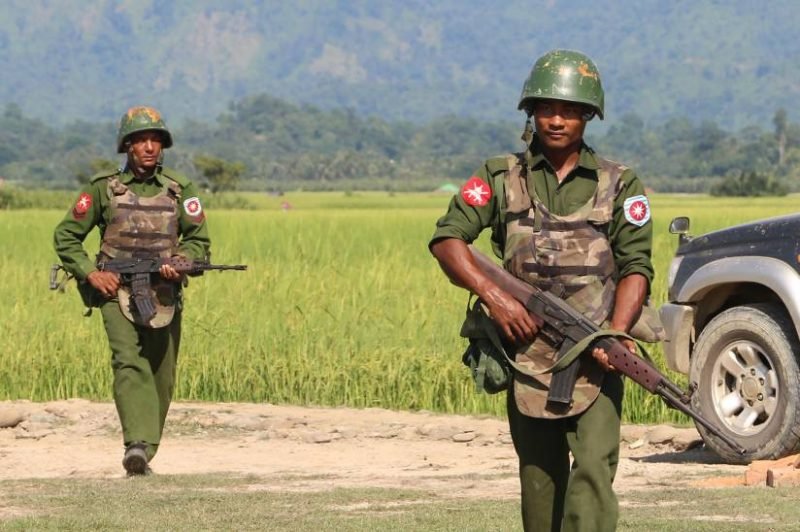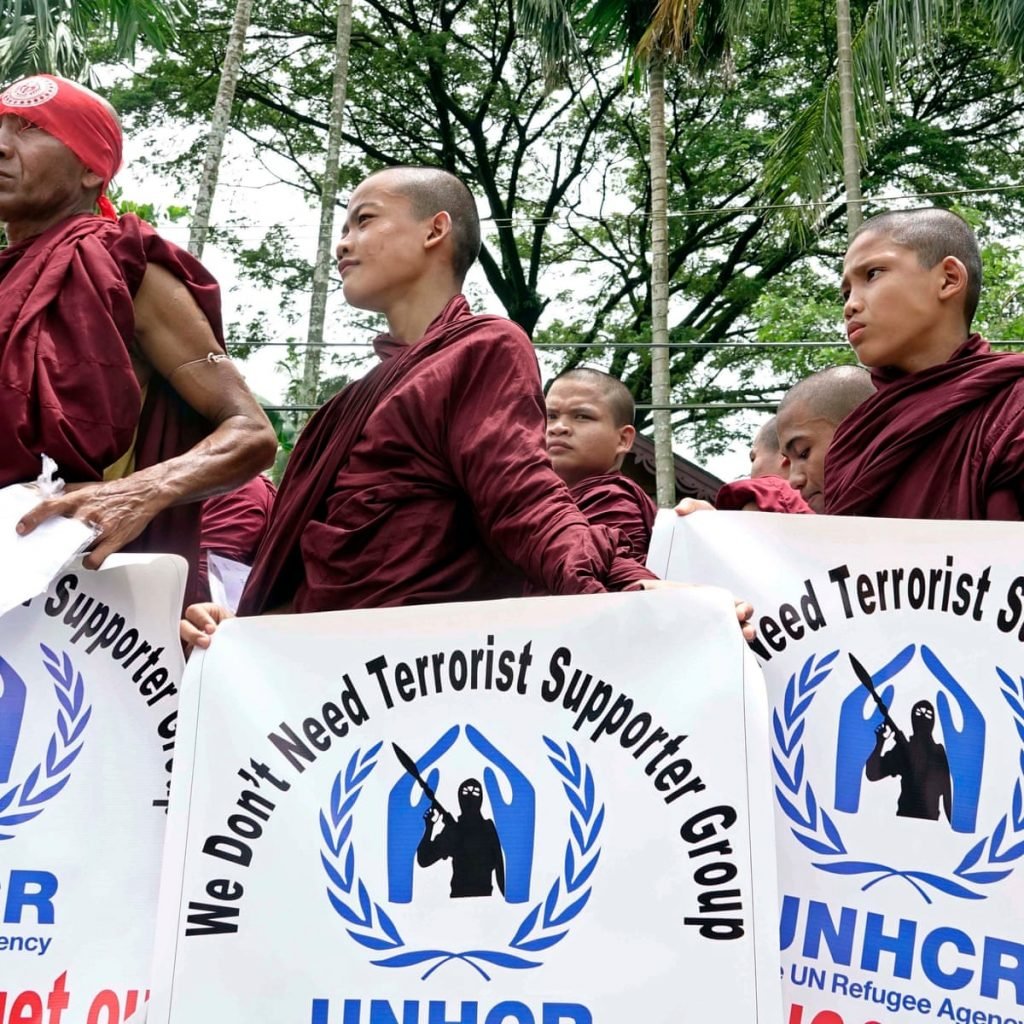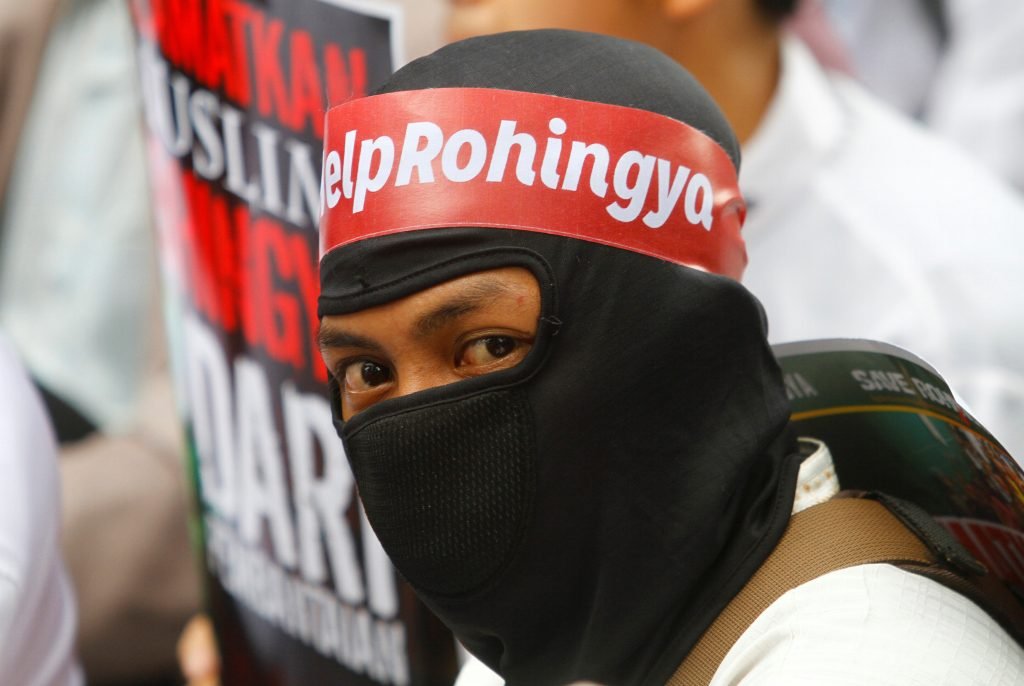Rise of Jihadist Camps in Myanmar could potentially threaten New Delhi’s security and sovereignty

The volatile situation prevailing in Myanmar and the brutal crackdown on protestors led by Military or Tatmadaw since the February 2 coup following the victory of Aung San Suu Kyi’s National League for Democracy in nationwide elections last November has brought Myanmar’s tentative democratic transition to an end. It has been seven months since the forced dismissal of Aung San Suu Kyi’s elective government and the road ahead seems to be in danger unlikely to get resolved in a short period.
Since the military coup of February 1, it is being estimated that more than 1,120 people have been killed as per by the United Nations and thousands have been arrested or detained forcibly. With reports being circulated all over the world accusing Junta of committing grave human rights violations in Myanmar and being responsible for the murder of Democracy, India on Wednesday took the central arena at UN and expressed concern at the “escalating situation” but called for support to a peaceful solution through “constructive” dialogue.
As the World leaders have till now failed to re-install democracy in Myanmar, the UN’s independent rights expert on Myanmar stated that the efforts done by the international community to put an end to the prevailing violence in Myanmar were inadequate. In a similar tone, Thomas H. Andrews, speaking at the 48th session of the United Nations Human Rights Council (UNHRC) stated that the crisis has become “even graver, with the continuing commission of mass atrocity crimes and a deadly escalation of armed conflict”.
“With the escalation of attacks by junta forces, the National Unity Government declared that the people of Myanmar have the right to protect themselves and, most recently, announced a ‘defensive war’ against the junta, in part to try to unite local civilian-led People’s Defence Forces (PDFs) throughout the country,” Andrews informed the member states of the UNHRC.
Expressing his concerns over the humanitarian crisis in Myanmar and the handling of state-wide demonstrations through force and violence, Andrews stressed that “Junta forces have responded to them with indiscriminate attacks on entire villages and towns. In the last two weeks alone, junta forces have set fire to dozens of homes across multiple villages including the horrific fire-bombing of a village that I witnessed after it was captured on video.”
Looking at the turmoil in the region, it thus becomes imperative for New Delhi to raise this issue at an international level as Myanmar shares an over 1,600-km long unprotected and penetrable land border with India, as well as a naval frontier in the Bay of Bengal. Along with this, it also shares a nearly 4,000-km-long international border with Bangladesh which becomes the fifth-longest land border in the world, with the state of West Bengal having the highest length with 2,217-kilometer.
Ambassador T S Tirumurti, the permanent representative of India to the United Nations in his briefing told the UN General Assembly High-Level Side Event Rohingya Crisis: Imperatives for a Sustainable Solution’ that India commends the Government of Bangladesh for hosting a million displaced persons in its territory.

As the only country which shares such a long and porous border with both Myanmar and Bangladesh, it is both a moral necessity and also a grave security concern for India to analyse the prevailing situations at its borders. While New Delhi has the biggest stake in resolving the issue of repatriation of displaced persons from the Rakhine State of Myanmar which Tirumurthi stressed at the UN adding that the world has till now been unable to address the problem and has failed to resolve the repatriation of displaced persons from the Rakhine State expeditiously.
Myanmar could become a laboratory for Global Jihadists which could threaten New Delhi security and sovereignty
For many years, Myanmar Junta has been raising a battle against the minority populations of Rakhine State especially the mostly ethnic Rohingya group. Historically, it was way back in 1947 when the first wave of violence erupted in prompting a series of mujahedeen struggles against the central state ensuing from 1947-1954 led by the North Arakan Muslim League, which intended to establish Rakhine as an independent state or as a part of East Pakistan, which after the 1971 war broke its ties from Pakistan and became an independent state, present-day Bangladesh. But the fight soon faded away with most of the fighters surrendered by 1957. The next wave of violence erupted in 1978 and 1991-1992 but ever since then the violence and atrocities committed by Tatmadaw have only amplified. It was in 2017 when the deadliest chapter of violence and atrocities culminated in Myanmar which resulted in the deadliest chapter of ethnic cleansing which the United Nations described as a ‘textbook example of ethnic cleansing against Rohingya Muslims, prompting a mass influx of refugees into adjacent bordering state, Bangladesh.
The presence of small ethnic militant groups in Myanmar at the border areas of India’s northeast states already had pressing concerns for New Delhi. But now when the US troops have finally withdrawal from Afghanistan resulting in the changer of power and the rise of Taliban 2.0, new concerns have been raised in demonstrating the emergence of Jihadist groups in the South East Asian Block amidst the power vacuum with the agenda of avenging the atrocities against Rohingya Muslims.
The regional Jihadist networks and operatives have been very vocal in their support of armed resistance against the Tatmadaw with both Pakistani Taliban and Islamic State affiliates offering training, weapons and financial assistance to aspirant jihadist groups in Rakhine State.
Apart from that other militant groups in South and South East Asia including Salafi-Jihadist organisations in Indonesia have reportedly expressed their intention to raise 1,200 volunteers for ‘humanitarian jihad’ in Myanmar, ostensibly to provide aid to Rohingya communities in their battle against the infidels.
In a similar context, the leaders of both Al-Qaeda and Islamic State which includes self-proclaimed caliph Abu Bakr al-Baghdadi who died in 2019 in Syria and al-Qaeda leader Ayman al-Zawahiri have called their support for Rohingya Muslims by announcing Jihad against Myanmar to avenge the atrocities committed by the military Junta.
Against this backdrop, a new jihadi group that could have to nurture in the backdoors of atrocities against Rohingyas emerged in November 2020, Katibah al-Mahdi fi Bilad al-Arakan (KMBA) and, through its spokesman Abu Lut al-Muhajir, swore allegiance to IS leader Abu Ibrahim al-Hashimi al-Qurayshi.
In this context, it becomes imperative for New Delhi to keep observing the situations and to engage in practices that could potentially destroy any further affinity with such ideologue as Myanmar shares a long border with India’s north-eastern states.

Speaking at the UN, Indian diplomat Pawankumar Badhe said “Continued instability in Myanmar has direct implications for India. We have also been facing the situation of people crossing over the border into India from Myanmar”.
A report by Reuters, published last week, outlined that around 5,500 people have arrived in India’s Mizoram from Myanmar in the last seven days after the Myanmar military set ablaze buildings in a border town, Thantlang in Chin State.
Since the coup, Rohingyas have been forced to migrate to Indonesia, Bangladesh and India while many have been sent back to their native country by the neighbouring states including that of India citing security concerns. In this insistence, as the Jihadist groups would love to get involved more deeply into the arena of Myanmar by propagating the slogan to fight against infidels and to punish Tatmadaw, therefore it thus becomes necessary to find what all potential threats do India could face at the face of Jihadist groups emerging in Myanmar amid the fight between junta and protestors and ethnic armed gangs.
The indefinite hosting of Rohingya refugees at over-crowded Bangladeshi camps such as Cox’s Bazaar and Bhasan Char provides a natural base for Jihadist groups to penetrate their radical ideologies into their minds and to propel them to avenge their hardships against the enemies of Islam. Militant groups such as Hizb-ut-Tahrir and Jamaat-ul-Mujahideen Bangladesh have already started to penetrate into this fiasco and have been strengthening their efforts to recruit more and more people from the displaced Rohingya diaspora especially at such overcrowded camps where people have been living in such bad conditions which could potentially become the next hot spot for jihadist recruitment.


















